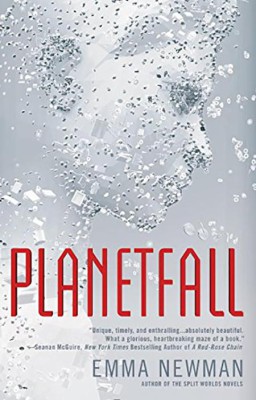Much of science fiction is concerned with traveling to distant planets, discovering new life and new environs. A great deal is made of the challenges people and technology would face getting off planet, or surviving a lengthy journey to this new planet. Not so in Emma Newman’s Planetfall. The real story of Newman’s novel is the challenges survivors face on the new planet, not because of environmental challenges or alien life, but the trials of clashing personalities and buried secrets.
Let’s get this out of the way first: Planetfall is not an easy book to discuss without giving away too much about its plot and characters. So I won’t give away too many of the finer details of the plot—what can be said is that approximately 1,000 colonists left Earth, including the protagonist, Renata “Ren” Ghali, who followed Lee Suh-Mi, her lover and leader of this group, to the new planet in what can best be described as a pilgrimage of faith. Earth was not in the best of shape, but there isn’t much more elaboration than that in the plot or background details. When the colonists arrived on the new planet, Lee entered a pre-existing structure the colonists discovered and came to name God’s City. When Newman begins the novel 20 odd years later, Lee had yet to return from God’s City and she is revered as something close to a saint as the people await her return and still follow the spirit of her beliefs.
Planetfall is at once a fascinating character study through Ren’s first person narrative and a novel that examines how secrets, no matter how deeply buried they are, can be extremely damaging things…especially in a small colony in a seeming utopia. Ren spends much of her day as the colony’s printer, responsible for overseeing an advanced 3-D printer which is used to repair damaged items or create new items when necessary. Any items. Ren’s obsession with repairing things is a mask for trying to repair the damages left in the wake of Lee’s disappearance, and an attempt to bury her own guilt in the tragic events which transpired nearly two decades ago.
One of those long-buried events was a fracturing of the colony that drastically reduced the number of human inhabitants on the planet. When Lee’s grandson Sung-Soo inexplicably arrives at the outskirts of the settlement surrounding God’s City, large cracks begin to appear in what was an otherwise idyllic settlement. Sung-Soo immediately gravitates to Ren, seeking to learn everything he can from her and to help her. He comes across as curious about his grandmother and looking to help Ren out of the shell she’s constructed around herself.
We get a very limited perspective from Ren, even more so than with other first person narratives. We mostly learn of things that are of immediate concern to Ren, any regrets she has are expressed mainly through the feelings she has about past events, with the actual details of those past events only touched upon and doled out piecemeal throughout the novel. Ren’s closest “friend” is Mack, a man with whom she shares dark secrets. Mack has become a leader of the colony, largely due to his charismatic nature. Back on Earth he was a powerful marketing executive, so he knows how to appeal to people. And while we’re on the topic of relationships (and barriers), I should mention that one of the most fascinating elements of the novel—taken for granted as commonplace by the characters—is the network by which everybody communicates: part Google Glass, part cellphone/instant messenger, all the members of the community are chipped and able to connect to one another in their heads.
The Unreliable Narrator is quite common in genre, but Newman has effectively dropped the mic on that narrative tool. Ren is a fractured woman who gives new depth to the meaning “unreliable,” and as the story progresses, Ren becomes less of an empathetic character from her fellow colonists’ perspective. If anything, as more is revealed, the greater the sense of pity and frustration she inspires.
In terms of that limited perspective, and the minimal details revealed, I was very much reminded of C.J. Cherryh, especially her first Foreigner novel, even if Cherryh’s novel was not told in a first person narrative. Only the most essential details as they impact the very current action are brought to light. In other ways, I was reminded of Mary Doria Russell’s powerful novel The Sparrow, and its sequel Children of God, in the way that science and religion are at odds with each other and how they work together to drive parts of the plot.
Newman’s prose has a haunting effect that hints at dread lurking beneath the surface, waiting to rear its disturbing head. When this prose is conveyed through Ren’s voice it makes for a compulsive, powerful read that is difficult to set aside. The ending leaves much to ponder and if I can raise any minor misgivings in the novel it is with the fairly abrupt manner that Newman brings the otherwise brilliant novel to a close. Beautifully and heartbreakingly wrought, Planetfall is a genius novel that is far more than its exterior belies; a distressing, harrowing novel that left a deep mark on me. It isn’t an easy, cheerful read, but it is a captivating story that can be very aptly be described as a must read.
Planetfall is available now from Roc.
Read an excerpt here on Tor.com!
Rob Bedford lives in NJ with his wife and dog. He reviews books and moderates forums at SFFWorld, has a blog about stuff, and writes for SF Signal as well as here at Tor.com. If you want to read random thoughts about books, TV, his dog, and beer you can follow him on Twitter: @RobHBedford.










